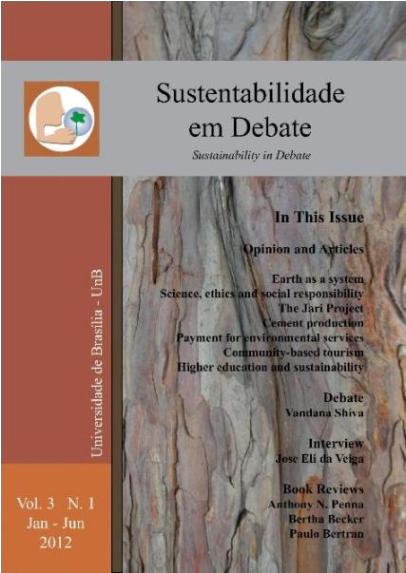O processo de comercialização do turismo de base comunitária no Brasil:
desafios, potencialidades e perspectivas
DOI:
https://doi.org/10.18472/SustDeb.v3n1.2012.7198Keywords:
Community-based tourism, Market access, Marketing;Abstract
The community-based tourism (CBT) has been consolidated over the last decade in Brazil as a way
of tourism organization at the local scale. However, much remains to be done to realize its full
potential to support the social development of local communities. In this paper we discuss the issue
of market access, suggested by some studies as critical to the economic sustainability of community
enterprises. We start from the analysis of some, national and international, documents and research
to propose strategic guidelines for the process of marketing of CBT initiatives and routes.
Downloads
References
Tourism (CBT) through the community resilience
programme. Report five. Government of
Botswana: Gaborone, 2009.
BURSZTYN, I. Desatando um nó na rede: sobre
um projeto de facilitação do comércio direto do
turismo de base comunitária na Amazônia. Tese
de doutorado, Programa de Engenharia de Produção
da COPPE/UFRJ, 2012.
BRASIL. Dinâmica e diversidade do turismo de
base comunitária: desafio para a formulação de
política pública. Brasília: Ministério do Turismo,
2010.
CISV. Comunita, Impegno, Servizio, Volontariato.
Turismo responsabile: quale interesse per gli
italiani?. Torino: Effata Editrice, 2009.
IPE. Instituto de Pesquisas Ecológicas. Proposta
de ações estratégicas para o desenvolvimento sustentável
do turismo de base comunitária no entorno
sul do Parque Nacional de Anavilhanas.
Manaus, 2011.
MIELKE, E. Monitoramento dos Projetos de
Turismo de Base Comunitária. Relatório Final. Rio
de Janeiro: Universidade do Estado do Rio de Janeiro,
2011.
MOLINA, S., O Pós-Turismo, tradução Roberto
Sperling, São Paulo: Aleph, 2003.
MTUR. Ministério do Turismo. Hábitos de consumo
do turismo do brasileiro. Brasília: Ministério
do Turismo, 2009.
MTUR. Ministério do Turismo. Perfil do turista
de aventura e do ecoturista no Brasil. Brasília:
Ministério do Turismo, 2010.
SILVA, K. T. P., RAMIRO, R. C. e TEIXEIRA,
B. S. Fomento ao turismo de base comunitária: a
experiência do Ministério do Turismo In
BARTHOLO, R. S., SANSOLO, D. G. e
BUSZRTYN, I. Turismo de base comunitária: diversidade
de olhares e experiências brasileiras. Rio
de Janeiro: Letra e Imagem, 2009.
SNV. Netherlands Development Organization.
The market for responsable tourism products.
ISBN 978-90-77821-29-9. Amsterdam: SNV, 2009.
TURISOL. Rede Brasileira de Turismo Comunitário
e Solidário. Apresentação realizada pelo representante
da organização durante o II Seminário
Internacional de Turismo Sustentável (Fortaleza,
Ceará), Brasil, 2008.
TURISOL. Relatório do Encontro de 2010. Disponível
em: http://www.turisol.org.br; acessado
em agosto de 2011.
URRY, J. O olhar do turista. São Paulo: Nobel/
SESC, 2001.
Downloads
Published
How to Cite
Issue
Section
License
SUSTAINABILITY IN DEBATE – Copyright Statement
The submission of original scientific work(s) by the authors, as the copyright holders of the text(s) sent to the journal, under the terms of Law 9.610/98, implies in the concession of copyrights of printed and/or digital publication to the Sustainability in Debate Journal of the article(s) approved for publication purposes, in a single issue of the journal. Furthermore, approved scientific work(s) will be released without any charge, or any kind of copyright reimbursement, through the journal’s website, for reading, printing and/or downloading of the text file, from the date of acceptance for publication purposes. Therefore, the authors, when submitting the article (s) to the journal, and gratuitous assignment of copyrights related to the submitted scientific work, are fully aware that they will not be remunerated for the publication of the article(s) in the journal.
The Sustainability in Debate Journal is licensed under Creative Commons License – Non-Commercial-No-Derivation Attribution (Derivative Work Ban) 3.0 Brazil, aiming at dissemination of scientific knowledge, as indicated on the journal's website, which allows the text to be shared, and be recognized in regards to its authorship and original publication in this journal.
Authors are allowed to sign additional contracts separately, for non-exclusive distribution of the works published in the Sustainability in Debate Journal (for example, in a book chapter), provided that it is expressed the texts were originally published in this journal. Authors are allowed and encouraged to publish and distribute their text online, following publication in Sustainability in Debate (e.g. in institutional repositories or their personal pages). The authors expressly agree to the terms of this Copyright Statement, which will be applied following the submission and publishing by this journal.








